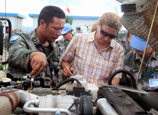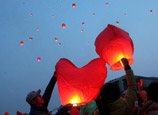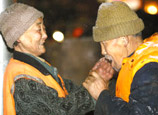
It seems that doing, rather than overtly expressing, is the language of care in many Asian cultures, whether parent for child, or grown children for parents, according to clinical psychologist Alfred Chambers, from the Beijing United Family Hospital and Clinics.
"Every culture and every individual has a different language of love. Understanding each other's language is very important for healthy relationships."
Chinese parents are often skeptical when they hear the words "I love you" from their grown children for the first time - perhaps because such directness is not common, and there is always a risk of loss of face or rejection if one is too open.
Saying the words back is "not complicated. We just don't learn. The behavior is not modeled so we don't know how - like learning to use chopsticks in Germany," he says.
"One thing we understand about human development is that right from birth we truly need care and safe contact with others in order to grow strong and confident in the world and comfortable within ourselves.
"That sort of contact can take many forms, and verbal expression is only one part of that. Nurturing contact is healthy for all of us and can come in as many forms as there are people, and it is craved for by all of us throughout our lives.
"Recognition can take many forms - but noticing and unconditional caring are needed - verbal or not.
"Simply saying 'I love you', which may or may not really mean anything, is not the answer.
"Authentically accepting and valuing the whole person, in whatever form it takes, is much more fulfilling and important. Deep down, this is what we all want."
















 Sanitation worker, environmental protector in city
Sanitation worker, environmental protector in city


![]()
